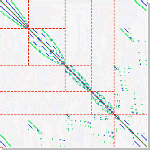|
|
|
Themes and Motivation
The innermost computational kernel of many large-scale scientific applications and industrial numerical
simulations is often a large sparse matrix problem, which typically consumes a significant portion of the overall
computational time required by the simulation. Many of the matrix problems are in the form of systems of linear equations,
although other matrix problems, such as eigenvalue calculations, can occur too.
Recent advances in technology have led to a dramatic
growth in the size of the matrices to be handled, and iterative techniques are often used in such circumstances, especially when
decompositional approaches require prohibitive storage requirements.
Computational experience accumulated in the past couple of decades indicates that a good preconditioner holds the key
for an effective iterative solver.
The conference will bring researchers and application scientists
in this field together to discuss the latest developments and progress made, and to exchange findings and explore possible new
directions.
The topics to be covered at the conference include,
but are not limited to, the following:
- incomplete factorization preconditioners
- domain decomposition preconditioners
- approximate inverse preconditioners
- block preconditioning
- multi-level preconditoners
- graph and mesh partitioners
- preconditioners based on randomization
- preconditioning techniques for finite element discretizations
- preconditioning multiphysics problems
- preconditioning techniques in eigenvalue computation,
optimization problems
- applications including but not limited to: computational fluid dynamics, materials science and nanosciences, image processing,
petroleum industry, semiconductor device simulations, computational finance, and data science
|
